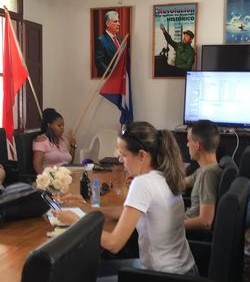Román Romero López
Actions that supported development in prioritized sectors of the economy, and compliance with the Cuban State Plan to Confront Climate Change (Task Life), were carried out by the Environmental Engineering and Biodiversity Center of Ciego de Ávila (Ciba), located in Morón. , in the year that ends.
In exclusive statements for the Cuban News Agency (ACN), the Master of Science Yamilé Jiménez Peña, director of that institution subordinate to the Environment Agency of the Ministry of Science, Technology and Environment, highlighted the integration into university centers and companies to contribute to territorial progress.
They advised various economic actors to form local development projects linked, fundamentally, to the agri-food sphere, which included research on the productive increase of sunflower cultivation through the use of beneficial indigenous microorganism technology.
Contributions are added to crop diversification, in response to the Food Sovereignty and Nutritional Education Program; actions to conserve soils through agroecological practices, and the strengthening of capacities in the agricultural sector, in coordination with other scientific centers and the Avilanian university.
They carried out environmental diagnoses in the base business units (UEB) Canteras Chambas, Frutales Sur, Industria Procesadora and Alevinaje de Morón, belonging to the companies of Construction Materials, Agroindustrial Ceballos and Pesquera Industrial de Ciego de Ávila (EPIVILA), respectively.
Ciba experts participated in working groups for the formation, evaluation and monitoring of Environmental Pollution and Biodiversity projects, which obey the Natural Resources and Environment Macroprogram, in turn integrated into the National Economic and Social Development Program until the year 2030.
As members of the technical advisory councils of the municipality of Morón and the province of Avila, they transmitted experiences and addressed core issues to promote scientific development at the local level, she pointed out.
Ciba has an important participation in the international Coastal Resilience project, which promotes an integrated vision of disaster risk reduction and adaptation to climate change in the planning of the socioeconomic development of vulnerable coastal municipalities in central-northern Cuba, considered Chambas. , in the northwest of Ciego de Ávila.
Called the Biofood Research Center until 2022, Ciba arrived on July 17 at the 31st anniversary of its constitution, with multiple national and international recognitions for its performance based on sustainable progress in strategic spheres of the economy.

